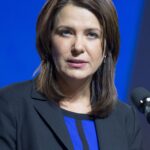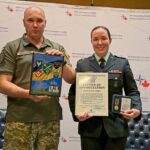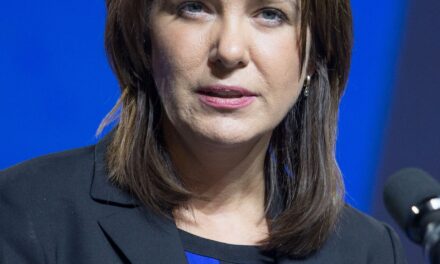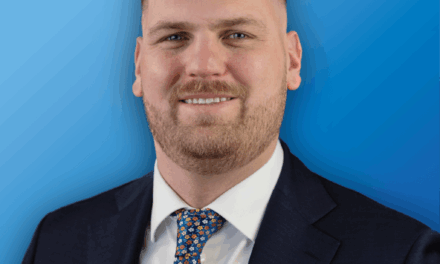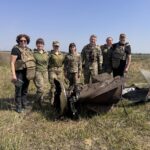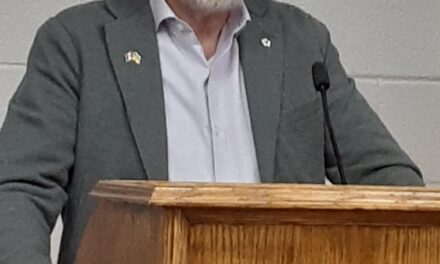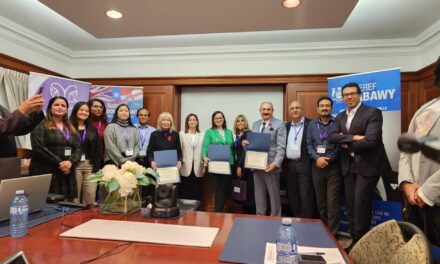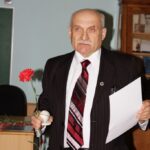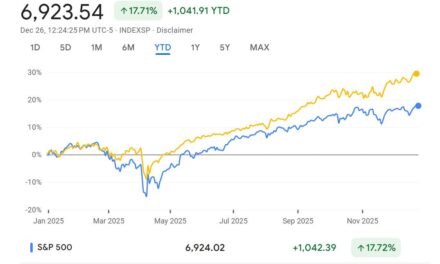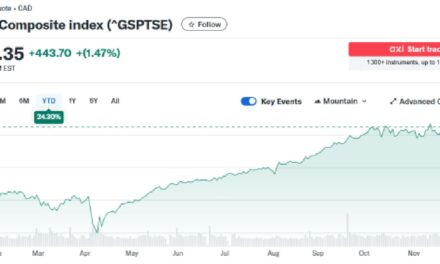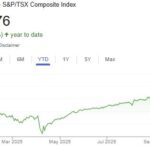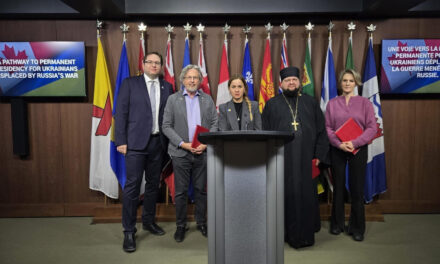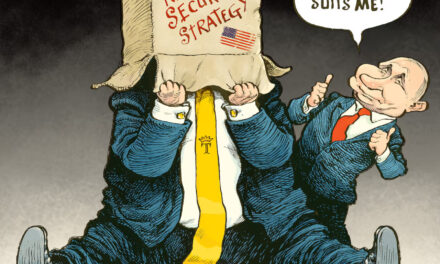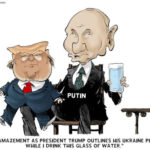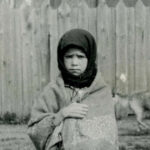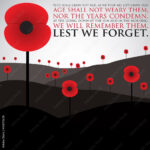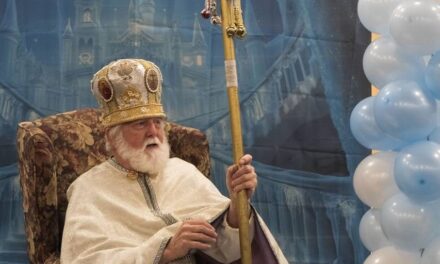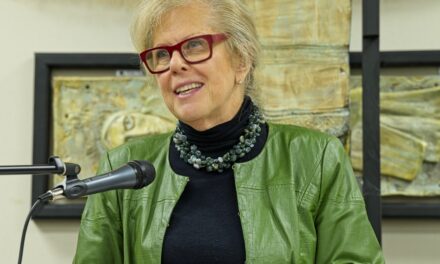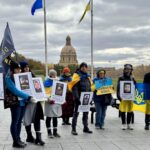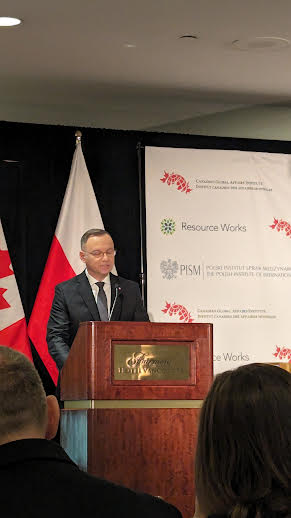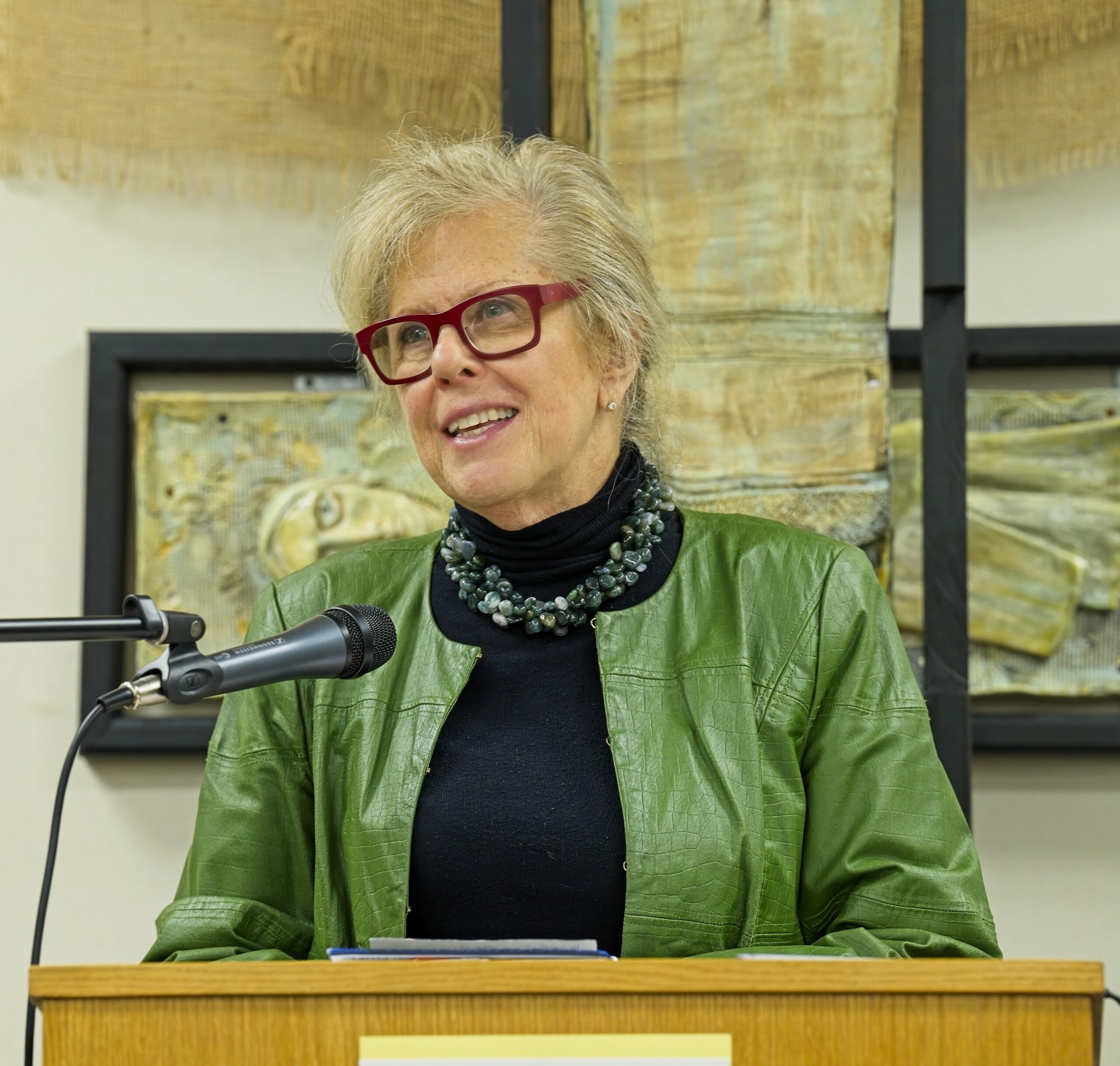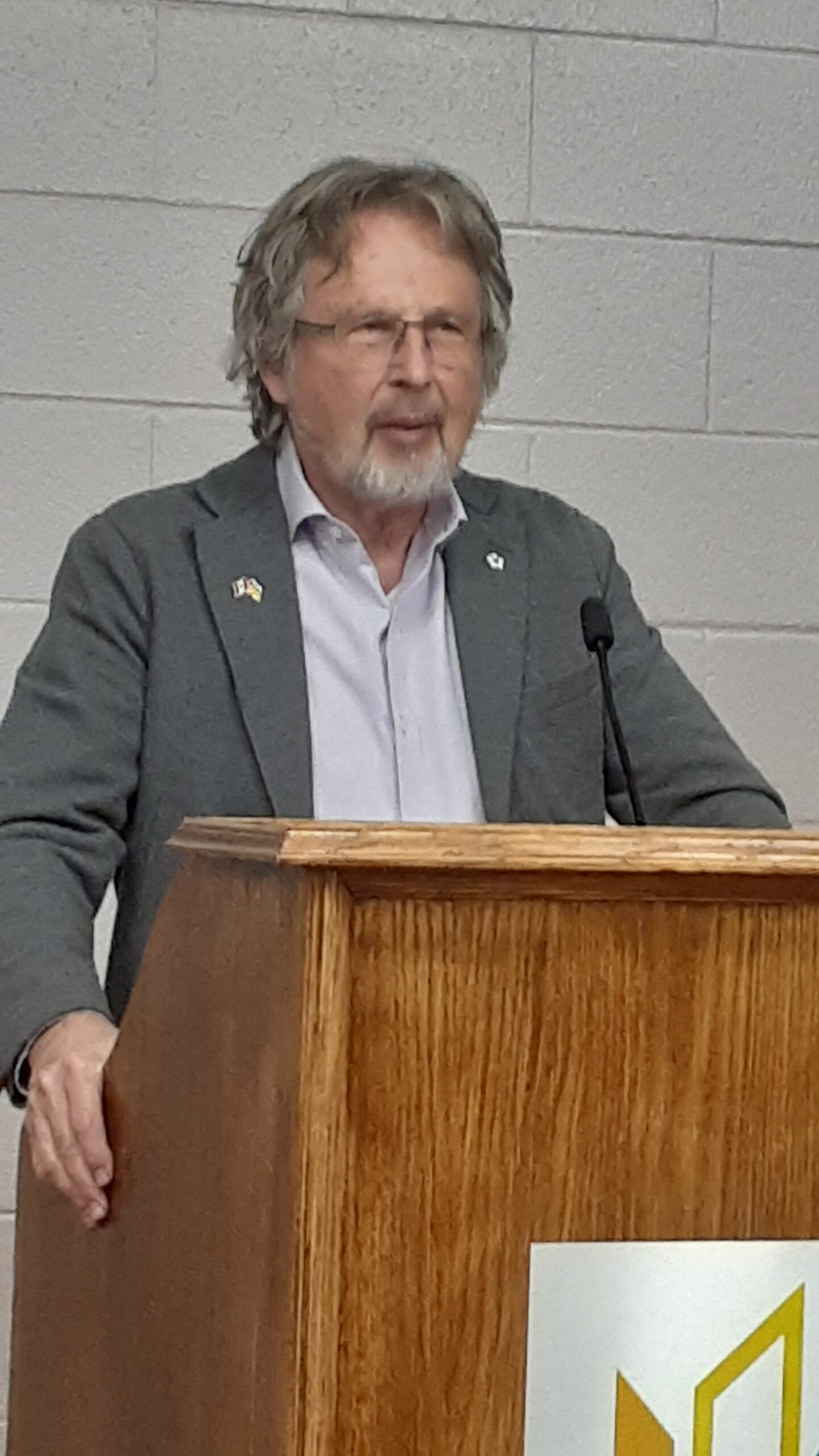Lev Romanyshyn for NP-UN.
On Friday, April 19th, your correspondent and Pani Natalya Jatskevych, Vice President, Ukrainian Canadian Congress, represented BC’s Honorary Consul of Ukraine, Lubomyr Huculak, at a seminar at Vancouver’s Fairmont Hotel. The seminar was notable for two reasons: the title (Transatlantic Security in the Shadow of Russia’s Long War) and the keynote speaker (the President of Poland, Andrzej Duda).
Whether he genuinely is a friend of Ukraine or is simply looking out for his own country’s interests doesn’t matter, but it was refreshing to hear a politician tell it like it is about a topic so close to most Ukrainians’ hearts and minds: russsia’s brutal and unprovoked invasion and genocide of Ukrainians. It is especially inspiring, given the empty promises, platitudes and prevarications that we’ve heard from so many other “influencers”, be they politicians, media personalities, academics or self-styled “experts” who advocate useless peace talks, or, even worse, advise Ukraine to capitulate and give up the territory which the invader has occupied.
President Duda did not mince words:
• “the dark shadow of Russia’s aggression against Ukraine looms not just over the transatlantic security, but also over the entire global security system.”
• “Moscow imperialism was born in the 15th century and has not changed much since then. Russian imperialism at the time of tsars, in the Soviet era, and today, means the same thing. It has, at its core, permanent expansion of the territory … at the cost of its neighbours in the west, south, and east, … reducing them to servitude and dominating them. It’s a kind of very brutal and intensive colonialism close to its borders. We have to realize that since this policy has lasted for hundreds of years without interruption, it will probably not change after Vladimir Putin has left the Kremlin. The emergence of another emperor is just a matter of time. For the true problem is not this or that ruler at the Kremlin, but the Imperial mindset of the Russian people.
And this is precisely why we must win at the frontline. If we hope for any kind of changes in Russia, we must bring about its clear military loss [my emphasis].”
• “Russians know exclusively the language of force, and they understand exclusively this very language. Regrettably, they don’t care much for Western sanctions and for declining living standards. They have enough forces and resources in stock to continue a long war of attrition. This is one of the goals pursued by the Kremlin: to entangle the whole Western world in a very long war and exhaust our societies with inflation, new waves of refugees, and sudden increases in energy prices.”
• “We must be bold and uncompromising.”
In 2014, NATO members pledged to raise their military spending to 2% of GDP. While that was enough 10 years ago, President Duda advises that it’s no longer sufficient today and Poland is advocating other NATO members to set 3% of GDP as the new target. [My comment: compare that to russia where defense spending is estimated at 7% of GDP, or Canada, where for years defence spending has been languishing in the vicinity of 1.5% of GDP, and, as recently reported in the press, our federal cabinet members are opposed to any further increases in defence spending].
Interestingly, President Duda recounted that both putin and former Polish President Lech Kaczynski prophesied today’s actions in Ukraine. First, putin did so, “in February 2007, in Munich’s Bayerischer Hof Hotel [where he] for half an hour accused the United States and countries of the West of creating a unipolar world in which there is just one master, one sovereign. He claimed that at the end of the day, it’s destructive. The culmination point of his speech was the conclusion that the free world had no importance or value for Russia. It was exactly then that Vladimir Putin publicly questioned the whole security architecture established after the Cold War and announced its destruction.”
Then, “… when Georgia was facing Russian aggression in 2008, the late Lech Kaczynski, then President of Poland, said these prophetic words at the rally in Tbilisi, “Today, Georgia; tomorrow, Ukraine; and the day after tomorrow, the Baltic states, and later maybe it’s time for my country, Poland.”” President Duda then added, “No one in the West listened to him.” [my comment: Ukrainians knew exactly what russia was like, but no one listened to them either. Not even in 2014 after putin’s “little green men” invaded Ukrainian Crimea and the russian-supported fifth column fomented a war in Donbas].
What was President Duda’s advice for the West? “
• … the most realistic scenario to ensure victory to Ukraine in a long-lasting war is to provide it with combat necessary capabilities in a well-thought-out and efficient way” and that “ NATO should play a significantly bigger role in supporting Ukraine.”
• “… we must deliver weapons to Ukraine as soon as possible—weapons which will realistically allow the [Ukrainian armed forces] to [drive the] Russian occupiers out of Ukrainian land.”
• “Furthermore, we must consistently and swiftly boost our forces and the military potential of NATO as a whole. This is the only efficient way of deterring Russia, for Russia never attacks those who are strong”.
Poland. as the guardian of the current eastern frontier of NATO, the EU and the Schengen Zone is putting its money where its mouth is: “Poland, like few countries in the world, knows that security comes at a price, which is why it allocates more than 4% of GDP to maintaining and modernizing its armed forces.” According to President Duda, Poland’s defence strategy can be described by one word: Deterrence.
During the Q&A, moderated by BC’s former Premier, Christy Clark, one member of the audience asked President Duda if he thought that the various global conflicts were related. His answer intimated that while russia may not be overtly involved in the Middle East conflict, it is there in the background and putin has achieved his goal of shifting attention away from the invasion of Ukraine and to the Middle East.
Members of the first discussion panel, “NATO at 75” (Canadian Ian Brodie and Poles Wojciech Lorenz and Patrycja Sasnal) made a few telling observations:
• Canadian military policy states that Canada should bolster Canadian and North American defence – but there is nothing about supporting international situations
• russia and China have both conducted naval exercises in the north Pacific, off the coast of Alaska, and, what lies next to Alaska? British Columbia, i.e., Canada.
• as the Ukrainian, Polish and Baltic states’ diasporas know, if putin succeeds in Ukraine, he will be encouraged to keep moving westward.
• a strength for Canada is the Ukrainian, Polish and Baltic states’ diasporas which help counter russia’s disinformation campaigns.
• especially if Trump is re-elected, the US’s focus will shift to the Pacific with Europe being secondary, which means that the European countries need to work without American assistance to strengthen their security [see previous comments by President Duda].
• we have seen that much of the global south is not 100% behind Ukraine. The hypothesis being that the countries in the southern hemisphere, while they may not necessarily be cheering for russia’s success, are very anti-NATO. Thus the West needs to revamp its communication strategies with the global south [my comment: we know that russia has been active in these countries with lobbying and investing and very likely whisper campaigns about how evil NATO is].
All in all, the sessions presented a “some good news” / “more bad news” scenario: while the eastern European countries are 100% with Ukraine, we see from the media that not all Western countries are willing to commit what is necessary for a Ukrainian victory, i.e., “[russia’s] clear military loss”, as President Duda advocates. The US, for now, is supplying munitions, but, come November, will this continue? The russian mindset hasn’t changed for centuries: no matter what pain and hardships russian citizens may suffer, its modus operandi is to grow the empire by subjugation and assimilation and russia has the resources to wage a long war of attrition to achieve this goal.
I personally put 100% of the blame for today’s situation on Western leaders in 2014, Obama, Merkel, Hollande and Cameron, who could have put an instant stop to putin’s ambitions when the first “little green men” landed in Crimea. They exhibited fecklessness and spinelessness with their ineffective sanctions and finger-wagging, and so here we are today: thousands killed, millions displaced, cities destroyed, economy in tatters. Some champions of freedom, democracy and the rule of law. With friends like that, … But this time around, we at least have EU and NATO members Poland, Lithuania, Estonia, Finland and Latvia in our corner, all of whom know quite well the ruthlessness and voraciousness of the russian bear.
Share on Social Media
